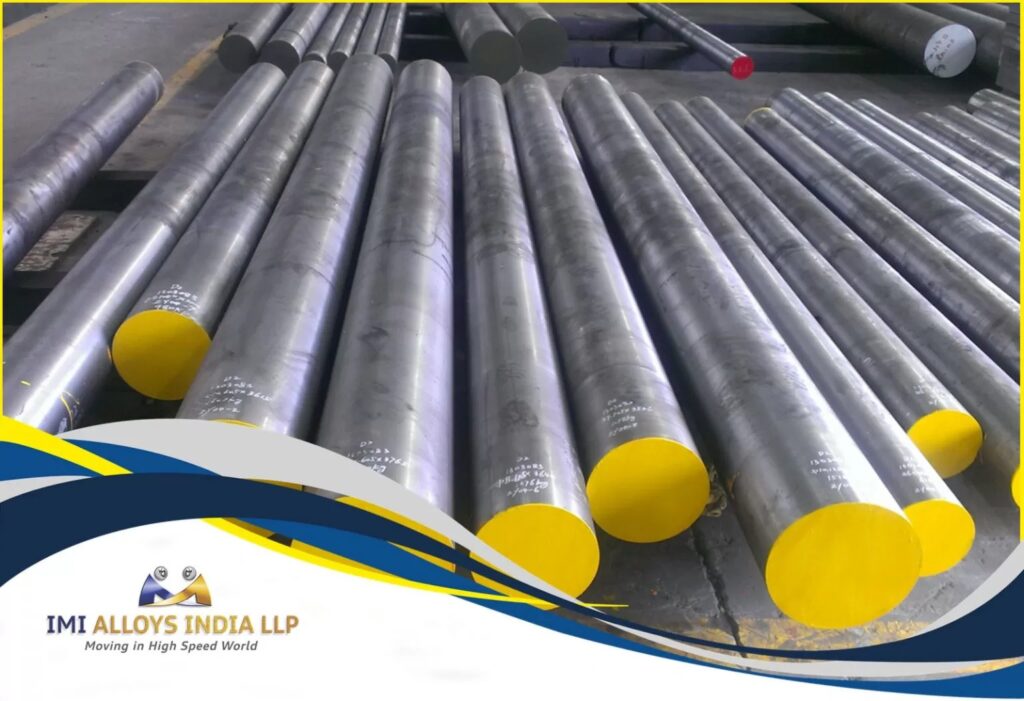
In the world of industrial manufacturing, the choice of materials plays a crucial role in determining the quality, efficiency, and durability of the final product. Among the wide range of steels available, the D3 Steel Bar stands out as a preferred material due to its unique composition and excellent performance under demanding conditions.
D3 Steel is a high-carbon, high-chromium tool steel belonging to the cold-work steel category. Its exceptional hardness, wear resistance, and dimensional stability make it a widely used choice for various manufacturing processes. In this blog, we will explore in depth the applications of D3 Steel Bar in manufacturing industries, its benefits, and why it has become a vital resource for industrial engineers and manufacturers worldwide.
What is D3 Steel?
Before diving into applications, it is essential to understand the material itself. D3 Steel is classified under the AISI D-series of tool steels, specifically designed for cold work. It contains high levels of carbon (around 2%) and chromium (around 12%), which provide the steel with exceptional wear resistance and hardness.
When manufactured in bar form, the D3 Steel Bar provides machinability, consistent strength, and durability that can be used for cutting, forming, stamping, and shaping applications.
Key properties of D3 Steel Bar include:
-
High hardness (after heat treatment, up to 60 HRC)
-
Excellent wear resistance
-
High dimensional stability
-
Corrosion resistance in comparison to regular carbon steels
-
Good compressive strength
These properties make D3 Steel Bar suitable for industries where heavy-duty equipment and long-lasting components are required.
Importance of D3 Steel Bar in Manufacturing
Manufacturing industries rely heavily on materials that can withstand extreme wear, pressure, and repeated usage. A material failure not only causes production delays but also increases operational costs.
This is where D3 Steel Bar provides an advantage. Its ability to maintain hardness and resist deformation ensures higher productivity and reduced downtime. Manufacturers prefer D3 steel bars for their tool-making applications, die creation, and forming equipment, ensuring that tools last longer without frequent replacements.
Applications of D3 Steel Bar in Manufacturing Industries
Now let’s explore the diverse applications of D3 Steel Bar across different industrial segments:
1. Tool and Die Making
One of the most significant uses of D3 Steel Bar is in the tool and die industry. Its wear resistance and dimensional stability make it an excellent material for creating dies, punches, and press tools.
-
Blanking and piercing dies – D3 Steel Bars are ideal for producing dies used in cutting and piercing sheet metals. Their hardness ensures clean cuts and extended die life.
-
Forming dies – In sheet metal industries, forming dies made from D3 Steel ensure precision shaping without deformation.
-
Punch tools – Punches need to resist both impact and wear. D3 Steel Bars provide that balance, making them a preferred choice.
In industries like automotive and electronics, where precision cutting is vital, D3 Steel ensures consistent quality in mass production.
2. Shear Blades and Cutting Tools
Cutting tools are at the heart of every manufacturing unit. From cutting sheet metals to trimming plastics, cutting tools must remain sharp and reliable.
-
Industrial shear blades made from D3 Steel Bars are used to cut sheet metals, wires, and other hard materials.
-
Cutting knives and trimmers benefit from D3’s hardness, staying sharp even after repetitive use.
-
Woodworking tools also utilize D3 Steel for saw blades and cutters, given its excellent edge retention.
The longevity of D3 Steel Bar cutting tools reduces replacement costs and ensures higher efficiency in operations.
3. Plastic Molding Industry
The plastic manufacturing industry relies heavily on molds and dies that can withstand repeated heating and cooling cycles. D3 Steel Bars are widely used for making molds, cavity inserts, and extrusion dies.
-
Their dimensional stability ensures that mold cavities remain accurate over extended usage.
-
High wear resistance allows plastic molds to withstand abrasive fillers without significant wear.
This makes D3 Steel Bar an economical solution for mold manufacturers who require both durability and precision.
4. Automotive Component Manufacturing
The automotive industry demands materials that can withstand high pressure, repetitive movements, and wear.
-
Dies for forging and stamping auto parts are made from D3 Steel Bars due to their hardness and wear resistance.
-
Punching tools for auto body panels rely on D3 for precision shaping.
-
Brake components, gears, and clutches sometimes use D3 Steel Bars in tooling and die-making processes.
This ensures that automotive components meet safety, durability, and dimensional accuracy standards consistently.
5. Cold Work Applications
Since D3 Steel belongs to the cold-work steel family, it finds maximum use in applications where materials are shaped at room temperature.
Some examples include:
-
Cold rolling dies used in steel plants.
-
Embossing and coining dies for creating designs and imprints on metals.
-
Thread rolling tools that form screw threads without cutting.
Its ability to resist wear during cold working processes makes D3 Steel Bar indispensable in this category.
6. Woodworking and Carpentry Tools
Beyond heavy industries, D3 Steel Bar also finds its way into woodworking applications.
-
Planer blades, chisels, and cutting knives made from D3 retain their sharpness longer than conventional steels.
-
Woodworkers prefer D3 Steel because it resists dulling, even when working with hardwoods or abrasive materials.
Thus, it offers cost-effectiveness and high productivity for carpentry and furniture manufacturing industries.
7. Aerospace and Defense Applications
Precision, strength, and durability are critical in aerospace and defense manufacturing. Although D3 Steel isn’t widely used for structural components, it plays an important role in tooling and part production.
-
Forming dies and punches used in aircraft component manufacturing are made from D3 Steel Bars.
-
In the defense sector, precision tools and blades often use D3 due to its wear resistance.
This ensures reliable performance in industries where errors are not acceptable.
8. Agriculture and Heavy Equipment Manufacturing
Agricultural machinery and heavy industrial equipment undergo continuous stress and wear. The tools and components used in their production often rely on D3 Steel Bar.
-
Stamping and forming tools for creating tractor and machinery components.
-
Cutting tools and blades for harvesting and soil preparation.
Since downtime in agriculture means lost productivity, D3 Steel ensures that tools last longer and reduce maintenance costs.
9. Textile and Paper Industries
The manufacturing of textiles and paper involves cutting, trimming, and shaping operations. D3 Steel Bars are used to make:
-
Knives for cutting fabric, leather, and paper rolls.
-
Perforation tools that maintain sharpness over repeated cycles.
Its resistance to abrasion makes it perfect for industries where continuous cutting is required.
10. General Engineering Applications
Apart from specialized uses, D3 Steel Bars are widely adopted in general engineering works.
-
Wear plates and liners in machinery.
-
Measuring tools and gauges requiring high accuracy.
-
Fixture and jig components for manufacturing support.
This versatility makes D3 Steel Bar a go-to choice across a variety of industries.
Advantages of Using D3 Steel Bar
To summarize the reasons why manufacturers prefer D3 Steel Bar, here are some key advantages:
-
Longer tool life due to wear resistance
-
Cost-effectiveness through reduced downtime and fewer replacements
-
High precision and dimensional stability
-
Excellent performance in cold work applications
-
Versatility across multiple industries
How to Ensure the Best Performance from D3 Steel Bar
To maximize the performance of D3 Steel Bar, proper treatment and handling are crucial:
-
Heat Treatment – Hardening and tempering processes enhance the hardness and wear resistance.
-
Surface Treatment – Processes like nitriding or coating can extend tool life further.
-
Proper Machining – Since D3 is highly wear-resistant, it requires precise machining techniques.
By following these practices, industries can ensure the best return on investment when using D3 Steel Bars.
Conclusion
The applications of D3 Steel Bar in manufacturing industries are vast and diverse. From tool and die making, automotive, plastic molding, and aerospace, to woodworking and textile cutting tools, its versatility makes it one of the most valuable materials in modern-day manufacturing.
With its high wear resistance, hardness, and dimensional stability, the D3 Steel Bar ensures longevity, precision, and efficiency in production environments. For manufacturers aiming to reduce downtime, improve product quality, and achieve cost-effective solutions, D3 Steel Bar remains an unmatched choice.

